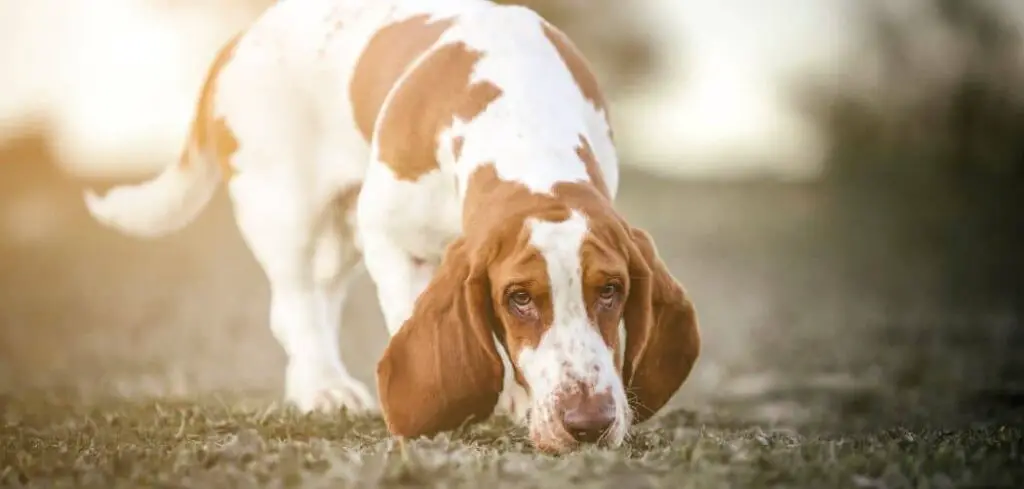If your dog has diarrhea and is dehydrated, we outline the signs of dehydration caused by diarrhea and what you can do to avoid dehydration complications, and when to seek help.
Here’s why dog diarrhea and dehydration occurs
Dehydration is a common complication of dog diarrhea and is caused by long-lasting or severe diarrhea that causes a tremendous loss of water and electrolytes in a short amount of time. This leads to life-threatening complications.

Dog diarrhea and dehydration
Dog diarrhea is characterized by loose and watery stool, which is passed more frequently than normal. This can cause a dog’s body to lose a lot of fluid, potentially leading to dehydration.
Diarrhea can be caused by a number of illnesses which includes gastrointestinal infections, diet, food allergies, medication side effects, illness, stress, and poisoning.
Occasional episodes of diarrhea in dogs are common and normal, however, frequent diarrhea as well as other concerning symptoms can be a sign of a serious underlying problem.
Dehydration is the most serious risk of dog diarrhea. If left untreated, dehydration can lead to serious complications.
Common signs of dehydration in dogs caused by untreated diarrhea include:
- Panting
- Loss of skin elasticity
- Smacking or licking of lips
- Lethargy
- Dry mouth
- Sunken eyes
- Seeking out water
- Dry sticky gums
- Dry nose
- Vomiting with or without diarrhea
Complications of dehydration from dog diarrhea
Acute diarrhea in dogs lasts for 1 – 2 days. This kind of diarrhea resolves on its own or with basic home care in one to two days.
Dog diarrhea is considered prolonged, or chronic when it lasts for more than 2 weeks.
If dog diarrhea is severe or lasts a long time, it can lead to severe dehydration. If left untreated, dehydration in a dog can lead to organ damage and other complications, such as:
- Irregular heartbeat
- Urinary tract infections
- Kidney damage
- Lethargy
- Unconsciousness
- Shock
- Death
It is therefore important to treat dehydration as soon as possible to reduce the risk of fatal outcomes for your dog.
How to prevent dehydration from dog diarrhea
Occasional dog diarrhea is not a cause for concern because it is normal especially if they continue to be active and do not show other symptoms that indicate they are sick such as fever, loss of appetite, or abdominal pain.
If your dog vomits once and appears normal, keep an eye on them to assess whether vomiting continues and if other symptoms appear.
If your dog is experiencing diarrhea and dehydration, you can take steps to help prevent dehydration complications and support your dog’s recovery from diarrhea. This includes:
Encouraging your dog to drink water: Make sure your dog has access to clean, fresh water at all the time and also encourage them to drink the water. This can help restore lost fluids and prevent dehydration.
Monitor their water intake: Keep an eye on how much water your dog is drinking and make sure they are drinking enough to stay hydrated. You can also monitor their urine output to ensure that they are properly hydrated.
Provide a bland diet: Once your dog’s diarrhea has subsided, you can offer them a bland diet of boiled chicken and rice. This helps to ease digestion.
Seek veterinary care: If your dog’s diarrhea persists, that is if they have diarrhea more than once or if they are showing other signs of illness, it is important to seek veterinary care as soon as possible.
Dog diarrhea and dehydration: When to seek help
If your dog is experiencing both severe diarrhea and dehydration, it is important to seek veterinary care as soon as possible.
Here are other signs that indicate that you should see a veterinarian immediately:
Severe or bloody diarrhea: If your dog’s diarrhea is severe or if there is blood or mucus in the stool, this could be a sign of a serious underlying condition and requires immediate veterinary attention.
Other symptoms: Other symptoms may accompany diarrhea and dehydration, such as vomiting. If your dog is vomiting along with diarrhea, this can quickly lead to severe dehydration and other complications.
Other symptoms to look out for include lethargy, lack of appetite, breathing difficulties, signs of pain or discomfort, fever, fainting, seizures, rapid heart rate, and difficulty in walking.
Suspicion poisoning: If you suspect that your dog has been poisoned, it is important to seek veterinary care immediately.
If your dog is a puppy or an older dog: Puppies and older are generally more vulnerable than healthy adult dogs so delaying treatment could result in their condition worsening or becoming more difficult to treat. Therefore, it is essential to seek immediate medical care.
Key Takeaway: Dog diarrhea and thirst
Diarrhea and dehydration in dogs can be caused by a variety of factors. While occasional diarrhea is normal in dogs, persistent diarrhea causes a dog to lose a lot of fluid leading to dehydration.
If left untreated, dehydration can cause serious complications. Therefore it is important to prevent dehydration if your dog has diarrhea.
If your dog’s diarrhea is sudden or it extends for a long period, consult with your veterinarian to determine the underlying cause and appropriate treatment.
By addressing the underlying cause of the symptoms and providing appropriate care, you can help ensure that your dog remains healthy.
Looking for comprehensive information on dog diarrhea and how to effectively manage it? Our comprehensive guide on dog diarrhea covers everything you need to know. Click here to dive deeper into this crucial topic and learn how to effectively manage this common canine issue.
